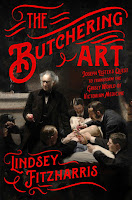Since a nasty shoulder fracture in 2009, I became quite interested in
medicine history, and I had this book in my to-read list for a few
months. A friend of mine recommended it, so off the list and into my
hands it went, and I'm glad it did (thanks Jo!). It's a biography of
Joseph Lister, a British medic who in the mid-XIX century championed the
then far-fetched idea that antisepsis in surgical procedures was
desirable, thus paving the way, together with the introduction of
anesthesia a few decades before, to modern surgery. Before Lister's
campaign, the very concept of sterilization was unknown, and it was
common practice to operate on a patient with knives and saws still
soiled with the blood of the previous one, not to mention the surgical
apron, which, never washed as tradition required, sported the
bloodstains of decades of amputations and incisions.
Dr. Fitzharris clearly has a passion for her subject, and it shows in the way she writes about the most horrific medical procedures imaginable (I still shudder remembering the removal of kidney stones) with glee and the subtlest hint of black humor: the result is one of the most appealing books I read in a long time. And as always when I read about medicine history, when I finished it, I thanked the gods for being born in the late XX century.
//
Da quando mi sono rotto malamente una spalla nel 2009, mi sono parecchio appassionato di storia della medicina, e avevo questo libro sul comodino* già da qualche mese. Un'amica me l'ha raccomandato, quindi dal comodino è passato nelle mie mani, e sono molto contento del trasferimento (grazie Jo!). È una biografia di Joseph Lister, un medico britannico che nella seconda metà del XIX secolo ha sostenuto l'allora inverosimile idea che le procedure antisettiche fossero opportune, aprendo la via, insieme all'introduzione dell'anestesia un paio di decenni prima, alla chirurgia moderna. Prima della campagna di Lister, il concetto stesso di sterilizzazione era sconosciuto, ed era pratica comune operare un paziente con bisturi e sega ancora sporchi del sangue di quello precedente, per non parlare del grembiule chirurgico, che per tradizione non veniva mai lavato e portava le macchie e gli schizzi di decenni di amputazioni e incisioni.
La dott.ssa Fitzharris è chiaramente appassionata della sua materia, lo si vede nel modo in cui riesce a parlare delle più terrificanti procedure che si possano immaginare (mi vengono ancora i brividi se penso alla rimozione dei calcoli) con euforica soddisfazione e un tocco quasi impercettibile di humor nero: il risultato è uno dei libri più accattivanti che abbia letto da parecchio tempo. E come sempre quando leggo di storia della medicina, quando l'ho finito ho ringraziato gli dei per essere nato alla fine del XX secolo.
* virtuale, visto che l'ho letto su Kindle
Voto: 4 su 5
The Butchering Art su Goodreads
Dr. Fitzharris clearly has a passion for her subject, and it shows in the way she writes about the most horrific medical procedures imaginable (I still shudder remembering the removal of kidney stones) with glee and the subtlest hint of black humor: the result is one of the most appealing books I read in a long time. And as always when I read about medicine history, when I finished it, I thanked the gods for being born in the late XX century.
//
Da quando mi sono rotto malamente una spalla nel 2009, mi sono parecchio appassionato di storia della medicina, e avevo questo libro sul comodino* già da qualche mese. Un'amica me l'ha raccomandato, quindi dal comodino è passato nelle mie mani, e sono molto contento del trasferimento (grazie Jo!). È una biografia di Joseph Lister, un medico britannico che nella seconda metà del XIX secolo ha sostenuto l'allora inverosimile idea che le procedure antisettiche fossero opportune, aprendo la via, insieme all'introduzione dell'anestesia un paio di decenni prima, alla chirurgia moderna. Prima della campagna di Lister, il concetto stesso di sterilizzazione era sconosciuto, ed era pratica comune operare un paziente con bisturi e sega ancora sporchi del sangue di quello precedente, per non parlare del grembiule chirurgico, che per tradizione non veniva mai lavato e portava le macchie e gli schizzi di decenni di amputazioni e incisioni.
La dott.ssa Fitzharris è chiaramente appassionata della sua materia, lo si vede nel modo in cui riesce a parlare delle più terrificanti procedure che si possano immaginare (mi vengono ancora i brividi se penso alla rimozione dei calcoli) con euforica soddisfazione e un tocco quasi impercettibile di humor nero: il risultato è uno dei libri più accattivanti che abbia letto da parecchio tempo. E come sempre quando leggo di storia della medicina, quando l'ho finito ho ringraziato gli dei per essere nato alla fine del XX secolo.
* virtuale, visto che l'ho letto su Kindle
Voto: 4 su 5
The Butchering Art su Goodreads

Commenti
Posta un commento